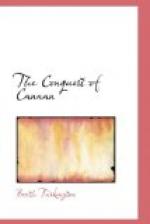“He wishes to stay, doesn’t he?”
“Very much, I think. And, Joe,” she continued, thoughtfully, “I want you to do something for me. I want you to go to church with me next Sunday.”
“To hear Mr. Ladew?”
“Yes. I wouldn’t ask except for that.”
“Very well,” he consented, with averted eyes. “I’ll go.”
Her face was radiant with the smile she gave him. “It will make me very happy,” she said.
He bent his head and fumbled over some papers he had taken from his pocket. “Will you listen to these memoranda? We have a great deal to go over before eight o’clock.”
Judge Pike stood for a long while where Joe had left him, staring out at the street, apparently. Really he saw nothing. Undoubtedly an image of blurring foliage, cast-iron, cement, and turf, with sunshine smeared over all, flickered upon the retinas of his eyes; but the brain did not accept the picture from the optic nerve. Martin Pike was busy with other visions. Joe Louden had followed him back to his hidden deeds and had read them aloud to him as Gabriel would read them on Judgment-day. Perhaps this was the Judgment-day.
Pike had taken charge of Roger Tabor’s affairs because the commissions as agent were not too inconsiderable to be neglected. To make the task simpler, he had sold, as time went on, the various properties of the estate, gradually converting all of them into cash. Then, the opportunity offering, he bought a stock which paid excellent dividends, had it transferred in blank, because if it should prove to Roger’s advantage to sell it, his agent could do so without any formal delays between Paris and Canaan. At least, that is what the Judge had told himself at the time, though it may be that some lurking whisperer in his soul had hinted that it might be well to preserve the great amount of cash in hand, and Roger’s stock was practically that. Then came the evil days. Laboriously, he had built up a name for conservatism which most of the town accepted, but secretly he had always been a gambler: Wall Street was his goal; to adventure there, as one of the great single-eyed Cyclopean man-eaters, his fond ambition; and he had conceived the distillery trust as a means to attain it; but the structure tumbled about his ears; other edifices of his crumbled at the same time; he found himself beset, his solvency endangered, and there was the Tabor stock, quite as good as gold; Roger had just died, and it was enough to save him.—Save? That was a strange way to be remembering it to-day, when Fate grinned at him out of a dreadful mask contorted like the face of Norbert Flitcroft.




